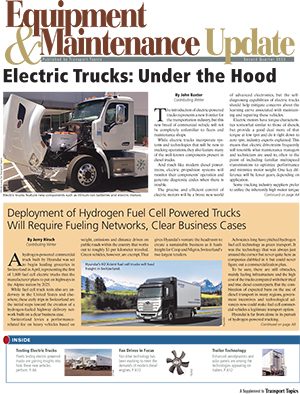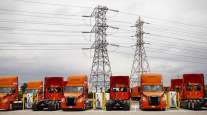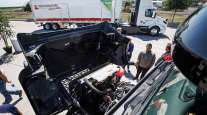Managing Editor, Features and Multimedia
Electric Trucks: Uncharted Territory for Maintenance

[Stay on top of transportation news: Get TTNews in your inbox.]
The introduction of electric-powered trucks will open up a whole new world for fleet maintenance. Although these zero-emissions trucks are only just beginning to hit the road through fleet testing, repair technicians eventually will need to learn how to work on these vehicles as they begin to penetrate the truck market in the years ahead.
That learning process might appear quite daunting when technicians glance under the hood for the first time.
The internal combustion engine — the beating heart of the traditional diesel-powered truck — is gone altogether, as are all of the related diesel emissions-reduction systems.

Clevenger
At the same time, unfamiliar components such as high-voltage battery packs and electric motors make their debut in these truck models.
And some truck manufacturers and industry suppliers are investing in yet another emerging technology, hydrogen fuel cells, to complement these electric propulsion systems.
While much of this technology is brand new to trucking, fleet maintenance operations will also find many well-known components as they dive deeper into this new segment of the commercial vehicle market.
Truck makers, meanwhile, will do their part to help ease the transition to electric vehicles by offering the same type of remote diagnostics capabilities that are available for today’s diesel trucks.

There’s no doubt that maintenance shops and technicians will have a lot to learn when electric trucks start rolling into their service bays, but the industry has become accustomed to working with new technologies over the years.
The evolution of commercial vehicles has accelerated in recent years, with more sensors and more advanced active-safety systems making their way onto modern trucks.
Another great example is the progression of truck emissions systems, including the introduction of diesel particulate filters and selective catalytic reduction over the past decade and a half.
As a side note, those diesel emissions systems will no longer be needed on fully electric trucks, a change that could significantly reduce the complexity of repairing and maintaining these vehicles.
The emergence of electric trucks represents a bold step into the future, but technicians and maintenance shops will rise to the challenge and adapt to this technology, just as they have with other new systems introduced in the past.
And much like diesel trucks, electric vehicles will continue to evolve as manufacturers and suppliers refine this technology and further tailor it to meet the rigorous demands of commercial trucking applications.
Want more news? Listen to today's daily briefing:




